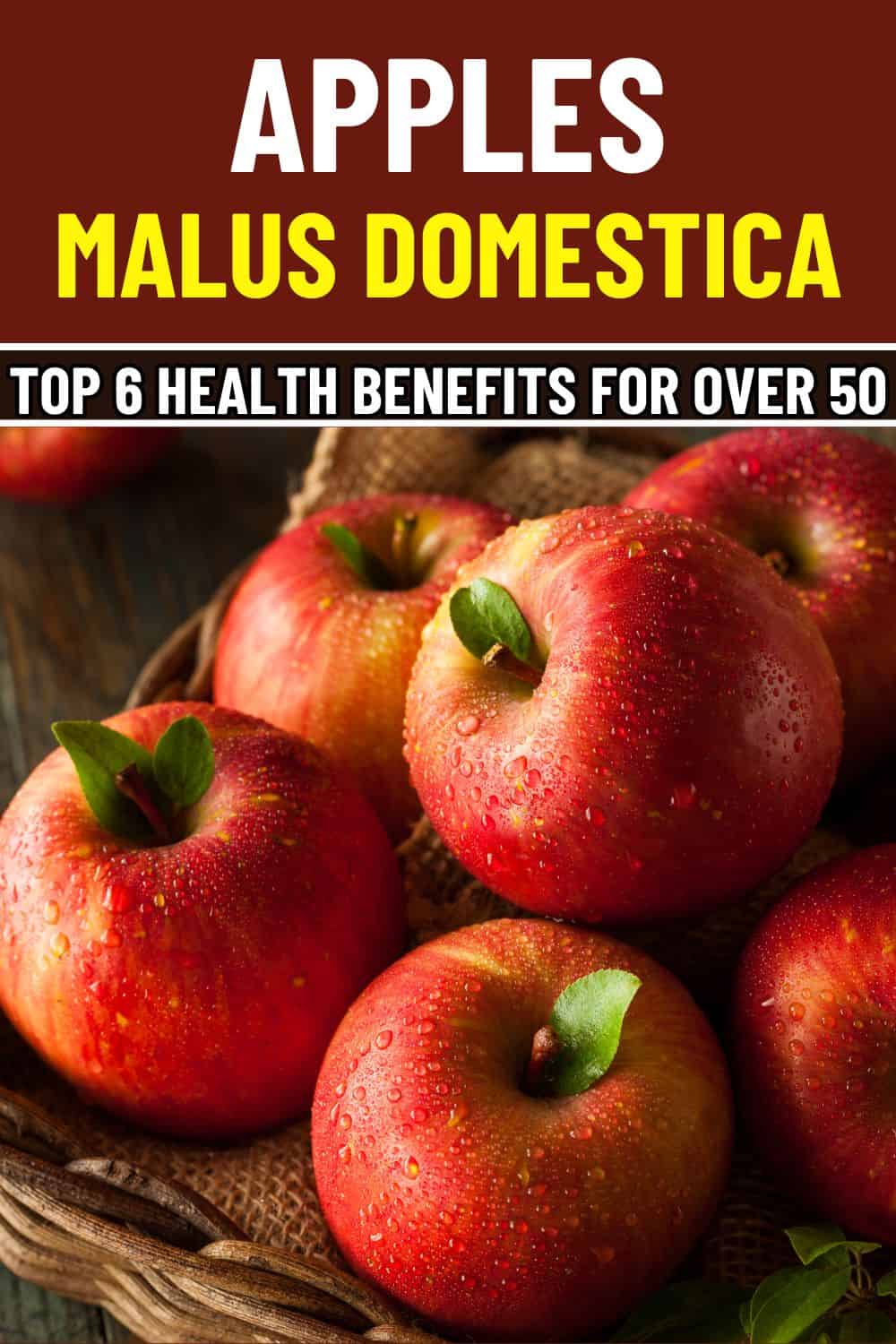Apples (Malus domestica) are not just delicious fruits but are packed with numerous health benefits, especially for people over 50.
Originating from Central Asia, apples have spread globally, becoming one of the most widely consumed fruits.
Known for their sweet, crisp texture and versatility in the kitchen, apples are also packed with nutrients that support aging healthily.
#1. Supports Heart Health
Apples are a great source of soluble fiber, particularly pectin, which helps reduce cholesterol levels by binding to excess cholesterol in the digestive system and removing it from the body.
In addition to fiber, apples are rich in potassium, which plays a key role in maintaining healthy blood pressure by balancing sodium levels.
A study published in The Journal of Nutrition found that regular apple consumption could contribute to healthier blood pressure and lower cholesterol levels.
This makes apples a heart-healthy choice, particularly for those concerned with maintaining a healthy cardiovascular system as they age.

#2. Aids Digestion and Prevents Constipation
The fiber in apples, particularly pectin, helps promote regular bowel movements and prevent constipation, a common concern as we age.
The soluble fiber in apples acts as a prebiotic, nourishing the beneficial bacteria in the gut and supporting overall gut health.
Moreover, apples contain a significant amount of water, which helps keep the digestive system hydrated, making digestion smoother.
A study in The Journal of Nutrition showed that apple fiber supports healthy gut microbiota, which is essential for digestive health, especially in older adults.

#3. Boosts Immune System
Apples are rich in Vitamin C, which boosts the immune system by promoting the production of white blood cells to fight infections.
As we age, maintaining a strong immune defense becomes crucial, and apples are a great ally in this.
Packed with antioxidants, they also help combat oxidative stress, a factor in immune decline.
A study in The American Journal of Clinical Nutrition shows that antioxidants in apples can improve immune function and lower the risk of chronic diseases.

#4. Supports Healthy Weight Management
Maintaining a healthy weight becomes more challenging as we age, but apples can be an excellent addition to a weight management plan.
Apples are low in calories and high in fiber, which helps you feel full and satisfied without consuming excessive calories.
Therefore, apples are a great snack option for those looking to manage their weight while still getting essential nutrients.
In fact, a study in Appetite Journal found that eating apples before a meal could help reduce overall calorie intake by making you feel fuller.

#5. Improves Skin Health
Apples are rich in antioxidants, such as Vitamin C and flavonoids, which help protect the skin from aging and environmental damage.
Vitamin C plays a vital role in collagen production, which is necessary for maintaining skin elasticity and preventing wrinkles.
Additionally, the antioxidants in apples help neutralize free radicals, which are unstable molecules that can damage skin cells and accelerate the aging process.
Studies, like one published in The Journal of Dermatology, show that antioxidants in apples can help reduce the appearance of fine lines and wrinkles, promoting a more youthful complexion.

#6. Supports Brain Health
The antioxidants in apples, particularly quercetin, help protect the brain from oxidative damage and inflammation.
This can play a role in slowing the progression of neurodegenerative diseases such as Alzheimer’s and Parkinson’s.
A study in The American Journal of Clinical Nutrition found that apple polyphenols may protect against cognitive decline and enhance memory.
Including apples in your daily diet may help preserve brain health, sharpen memory, and improve overall cognitive function.

How to Incorporate Apples into Your Daily Routine
- Eat raw: Enjoy apples as a quick and healthy snack. Choose different varieties like Fuji, Gala, or Granny Smith for variety. People over 50 should aim to consume one medium-sized apple a day to benefit from its fiber and antioxidants.
- Add to smoothies: Toss apple slices into your morning smoothie for a refreshing and fiber-packed drink. If you’re over 50, consider adding a handful of spinach or kale to your smoothie for extra vitamins and minerals that support bone health.
- Bake them: Slice apples and bake with a sprinkle of cinnamon for a warm, comforting dessert. This is a great choice for people over 50 because cinnamon can help regulate blood sugar levels, and baked apples are gentle on digestion.
- Toss in salads: Add apples to your salads for a crunchy, sweet touch. For those over 50, this is a perfect way to increase fiber intake and boost digestion.
- Make apple chips: Slice apples thinly, bake, and season them to create a healthy alternative to chips.

Cautions and Precautions
Some individuals may have an apple allergy, especially to the proteins found in the skin. Consult a healthcare provider if you notice any allergic reactions, such as itching or swelling.
Apples, while low in calories, do contain natural sugars. If you have diabetes or need to monitor blood sugar levels, be mindful of your apple intake.
Apples are high in fiber, which can cause digestive discomfort like bloating in some individuals. Start with a small serving if you’re not used to a high-fiber diet.
Disclaimer
This article is for informational purposes only and does not replace medical advice.
Always consult a healthcare provider before making any significant dietary changes, particularly if you have underlying health conditions or are taking medications.







